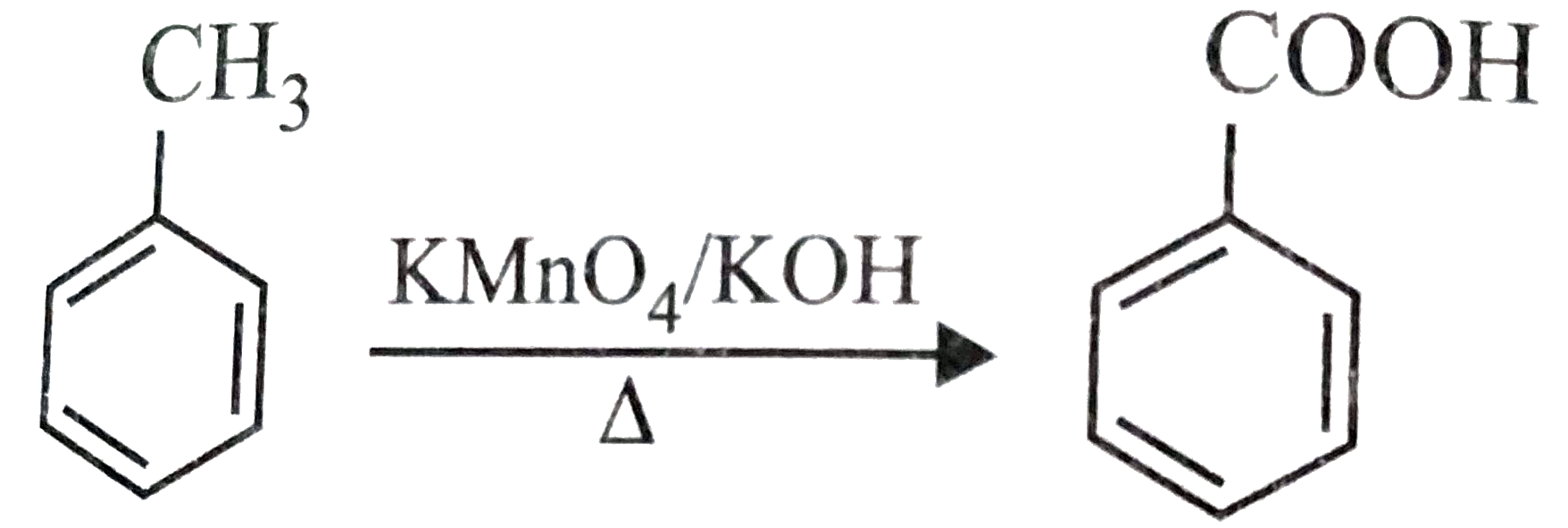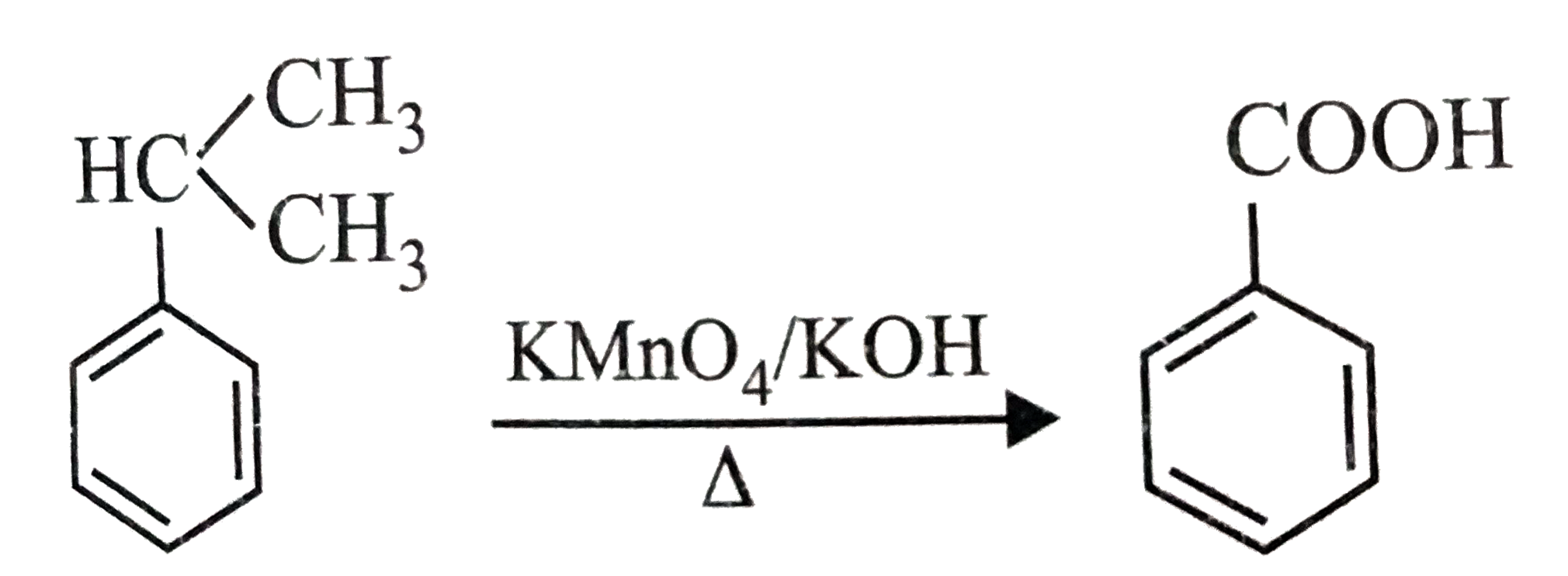Which of the following reactions does not occur ?




The correct Answer is:D
To determine which of the following reactions does not occur, we need to analyze the reactions involving benzene substituted alkyl groups with potassium permanganate (KMnO4) in the presence of a strong alkali (KOH) and heat. This reaction is an oxidation reaction that converts alkyl side chains into carboxylic acids, specifically benzoic acid.
1. Identify the Reaction Type:
The reaction in question involves the oxidation of benzene substituted alkyl groups. KMnO4 in an alkaline medium is known to oxidize alkyl groups attached to benzene rings, converting them into carboxylic acids.
2. Determine the Structure of Alkyl Groups:
For the reaction to occur, the alkyl group must have at least one hydrogen atom attached to the carbon that is directly connected to the benzene ring. This is crucial because the oxidation process involves the removal of hydrogen or the addition of oxygen.
3. Examine Each Option:
- If the alkyl group has at least one hydrogen atom on the carbon adjacent to the benzene ring, the oxidation will proceed, leading to the formation of benzoic acid.
- If the alkyl group has no hydrogen atoms on the carbon adjacent to the benzene ring, the oxidation cannot occur.
4. Analyze the Given Alkyl Groups:
- For example, if we have alkyl groups like CH3- (methyl), CH2- (methylene), or CH- (methine), they all contain hydrogen atoms and can be oxidized to benzoic acid.
- However, if we have a tertiary alkyl group (like C(CH3)3), there are no hydrogen atoms on the carbon that is bonded to the benzene ring. Therefore, this reaction cannot occur.
5. Conclusion:
Based on the analysis, the reaction that does not occur is the one involving a benzene substituted alkyl group that lacks hydrogen atoms on the carbon adjacent to the benzene ring. Thus, the correct answer is the option that represents such a structure.
Final Answer:
The reaction that does not occur is option D (the structure with no hydrogen on the benzene substituted carbon).
The reaction in question involves the oxidation of benzene substituted alkyl groups. KMnO4 in an alkaline medium is known to oxidize alkyl groups attached to benzene rings, converting them into carboxylic acids.
For the reaction to occur, the alkyl group must have at least one hydrogen atom attached to the carbon that is directly connected to the benzene ring. This is crucial because the oxidation process involves the removal of hydrogen or the addition of oxygen.
- If the alkyl group has at least one hydrogen atom on the carbon adjacent to the benzene ring, the oxidation will proceed, leading to the formation of benzoic acid.
- If the alkyl group has no hydrogen atoms on the carbon adjacent to the benzene ring, the oxidation cannot occur.
- For example, if we have alkyl groups like CH3- (methyl), CH2- (methylene), or CH- (methine), they all contain hydrogen atoms and can be oxidized to benzoic acid.
- However, if we have a tertiary alkyl group (like C(CH3)3), there are no hydrogen atoms on the carbon that is bonded to the benzene ring. Therefore, this reaction cannot occur.
Based on the analysis, the reaction that does not occur is the one involving a benzene substituted alkyl group that lacks hydrogen atoms on the carbon adjacent to the benzene ring. Thus, the correct answer is the option that represents such a structure.
The reaction that does not occur is option D (the structure with no hydrogen on the benzene substituted carbon).
Topper's Solved these Questions
- BOOK - NCERT FINGERTPS ENGLISHCHAPTER - ALDEHYDES, KETONES AND CARBOXYLIC ACIDSEXERCISE - MCQs( PHYSICAL PROPERTIES )2videos
ALDEHYDES, KETONES AND CARBOXYLIC ACIDS
- BOOK - NCERT FINGERTPS ENGLISHCHAPTER - ALDEHYDES, KETONES AND CARBOXYLIC ACIDSEXERCISE - MCQs(CHEMICAL REACTIONS )18videos
ALDEHYDES, KETONES AND CARBOXYLIC ACIDS
- BOOK - NCERT FINGERTPS ENGLISHCHAPTER - ALDEHYDES, KETONES AND CARBOXYLIC ACIDSEXERCISE - MCQs( NOMENCLATURE AND STRUCTURE OF CARBOXYL GROUP )2videos
ALDEHYDES, KETONES AND CARBOXYLIC ACIDS
- BOOK - NCERT FINGERTPS ENGLISHCHAPTER - ALCOHOLS,PHENOLS AND ETHERSEXERCISE - Assertion And Reason14videos
ALCOHOLS,PHENOLS AND ETHERS
- BOOK - NCERT FINGERTPS ENGLISHCHAPTER - AMINES EXERCISE - ASSERTION & REASON CORNER14videos
AMINES
Similar Questions
Knowledge Check
- Question 1 - Select One
Which of the following reactions does not proceed in forward direction?
APh3C−H+CH3(CH2)3Na→Ph3Cna+CH3(CH2)2CH3B CCH3−O∣∣C−CH2−O∣∣C−CH3+C2H5өON⊕a→CH3−O∣∣C−CH=өO⊕Na∣C−CH3+C2H5OHD
CCH3−O∣∣C−CH2−O∣∣C−CH3+C2H5өON⊕a→CH3−O∣∣C−CH=өO⊕Na∣C−CH3+C2H5OHD
- Question 2 - Select One
Which of the following reactions does not proceed in forward direction?
ACH3CH2SH+NaOH→CH3CH2Sna+H2OBCH3CH2OH+CH3MgBr→CH3CH2OMgBr+CH4CCH3CH2OH+NaOH→CH3CH2Ona+H2ODCH3CH2OH+NaH→CH3CH2Ona+H2
Which of the following reaction does not occur in Bessemer’s converter ?
View SolutionWhich of the following reaction does not occur in Bessemer’s converter ?
View SolutionWhich of the following reactions will not occur ?
View SolutionWhich of the following reactions does not form salicylic acid ?
View SolutionWhich of the following reactions does not produce oxygen ?
View SolutionWhich of the following reaction does not produce ethyne ?
View Solution
